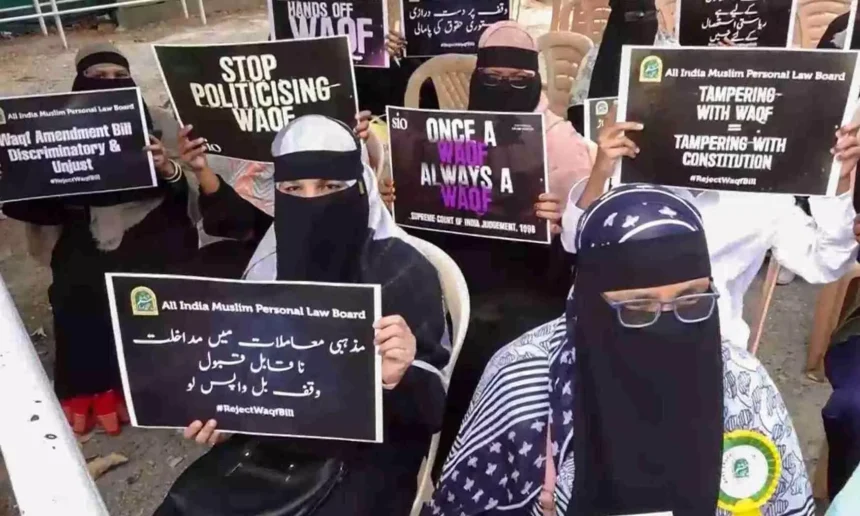Let’s not call it a “victory.” Let’s not pretend it’s “balanced.” Let’s not sanitize the truth with legalese.
The Supreme Court’s September 15, 2025 judgment on the Waqf (Amendment) Act is not a shield for Muslim rights — it is a scalpel, surgically removing the most grotesque tumors from a malignant law while leaving the cancer intact. And to those who still believe the Court is a neutral guardian of constitutional morality — look again. This is not 1973. This is not Kesavananda Bharati. This is post-2019 India, where even the judiciary genuflects before majoritarian power — and Muslim rights are negotiable collateral.
Yes, the Court stayed some provisions. Yes, it called the “five-year Islam test” arbitrary — not because it violated faith, but because there’s no mechanism to measure devotion like a blood test. Yes, it blocked the state from unilaterally erasing waqf properties from revenue records — not because waqfs are sacred trusts, but because “title disputes belong in court.” Generous crumbs, tossed from the high table of institutional power.
But let’s be brutally honest: the Court refused to stay the Act in its entirety. It refused to acknowledge that the entire law — from its DNA to its design — is a weapon forged in the furnace of Hindutva ideology to dispossess, disempower, and dismantle Muslim economic and spiritual autonomy.
This is not jurisprudence. This is juris-pragmatism.
And if you’re still clinging to hope — remember Babri.
Remember how, in 2019, the same Court handed over the birthplace of Lord Ram to Hindus — not on evidence, not on title, but on “belief” and “possession.” Remember how it rewarded illegal demolition with legal title. Remember how it told Muslims: “You lost the land, but you can have a five-acre consolation prize in a swamp.” That wasn’t justice. That was surrender dressed in silk robes.
Now, six years later, the pattern is undeniable.
The Waqf Amendment Act, 2025 is not about “transparency.” It is about control. It is about:
— Erasing “waqf by user” — centuries-old dargahs, graveyards, mosques with no paperwork — because if your ancestors didn’t file Form 1A under Mughal rule, your sacred space is now “unregistered” and vulnerable.
— Installing non-Muslims as gatekeepers — up to 4 in the Central Council, 3 in State Boards — so that Muslim endowments are managed by those who may not believe in their sanctity.
— Forcing Muslims to prove their faith — as if devotion is a bureaucratic checkbox, and not a matter of the soul.
And what did the Court do? It tweaked the edges. It said: “You can’t take their property yet — wait for the tribunal.” It said: “Muslim CEOs are preferred — as far as possible.” It said: “Register your waqfs — you had 102 years, what took you so long?”
This is not neutrality. This is gaslighting.
The Court’s tone drips with condescension — as if Mutawallis have been lazy bureaucrats rather than custodians of community assets under siege for decades. As if the reason dargahs weren’t “registered” is negligence — not state hostility, police raids, and bulldozer justice.
And the most chilling line? The Court’s casual dismissal of tribal Muslims’ right to donate land — citing a JPC report that claims waqfs “threaten cultural minorities.” Translation: Tribal identity is only valid when it aligns with Hindu majoritarianism. If you’re a tribal who’s Muslim? Your land, your faith, your autonomy — all suspect.
This judgment is a microcosm of modern India’s betrayal:
— The Executive drafts laws to erase Muslim presence.
— The Legislature passes them with brute majority.
— The Judiciary doesn’t strike them down — it “manages” them.
And the people? We’re told to be grateful for the scraps.
Saniya Ansari in Gujarat was beaten to suicide because the state told her family: “You can’t live here.” Now, the Supreme Court is telling all Muslims: “You can’t own here — not without our permission, not without paperwork, not without proving you’re Muslim enough.”
This is ghettoization by gazette notification.
This is dispossession by procedure.
This is humiliation by judgment.
The Court had a chance to draw a line. To say: “Enough. The Constitution does not bow to majoritarian engineering.” Instead, it chose calibration over courage. It chose optics over justice.
To Muslim India: Do not be fooled. Do not be pacified. This is not protection — it is probation.
The Waqf Act remains. The bulldozers are still idling. The next dargah, the next graveyard, the next mosque — still vulnerable.
And the judges? They’ve shown their hand.
From Babri to Waqf — the message is consistent: In the eyes of this Republic, Muslim rights are provisional. Conditional. Revocable.
Until we rise — not just in protest, but in power — until we vote, litigate, organize, and refuse to be erased — Saniya’s fate and the fate of our waqfs will be the same: death by a thousand legal cuts.
The Court has spoken.
Now, the people must oppose.










